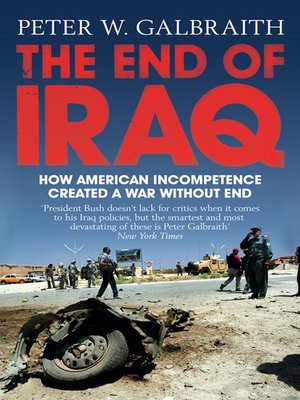
Sign up to save your library
With an OverDrive account, you can save your favorite libraries for at-a-glance information about availability. Find out more about OverDrive accounts.
Find this title in Libby, the library reading app by OverDrive.



Search for a digital library with this title
Title found at these libraries:
| Loading... |
The invasion of Iraq by American, British and other coalition forces has indeed transformed the Middle East, but not as the Bush and Blair administrations had imagined. It is Iran, not Western-style democracy, that has emerged as the big winner, creating a Tehran-Baghdad axis that would have been unthinkable before the war.
THE END OF IRAQ is the definitive account of the US and UK's catastrophic involvement in Iraq, as told by America's leading independent expert on the country. Peter Galbraith reveals in exquisite detail how US policies — some going back to the Reagan administration — have now produced a nearly independent Kurdistan in the north, an Islamic state in the south, and uncontrollable insurgency in the centre, and an incipient Sunni-Shiite civil war that has Baghdad as its central front. Iraq, Galbraith argues, cannot be reconstructed as a single state. Instead, a sensible strategy must accept that it has already broken up and focus instead on stopping an escalating civil war.
Unflinching, accessible and powerful, THE END OF IRAQ explores and explains the myriad mistakes and false assumptions that have brought the country to its current pass, and what must be done to prevent further bloodshed.
THE END OF IRAQ is the definitive account of the US and UK's catastrophic involvement in Iraq, as told by America's leading independent expert on the country. Peter Galbraith reveals in exquisite detail how US policies — some going back to the Reagan administration — have now produced a nearly independent Kurdistan in the north, an Islamic state in the south, and uncontrollable insurgency in the centre, and an incipient Sunni-Shiite civil war that has Baghdad as its central front. Iraq, Galbraith argues, cannot be reconstructed as a single state. Instead, a sensible strategy must accept that it has already broken up and focus instead on stopping an escalating civil war.
Unflinching, accessible and powerful, THE END OF IRAQ explores and explains the myriad mistakes and false assumptions that have brought the country to its current pass, and what must be done to prevent further bloodshed.






